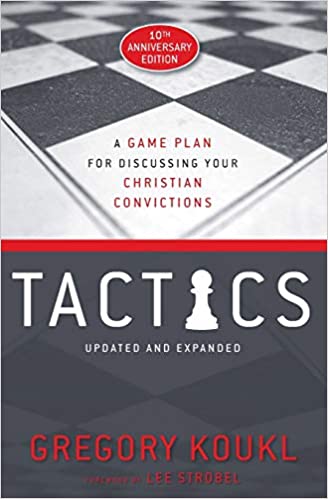A Brief Book Summary from Books At a Glance
By Steve West
About the Author
Gregory Koukl holds MA degrees in apologetics and philosophy. He is a frequent speaker on university campuses and hosts his own radio program. Greg is an adjunct professor at Biola University and is the founder and president of Stand To Reason.
Introduction
Tactics is a book that is designed to help Christians learn practical strategies for defending their faith. It does not provide all the typical apologetic arguments, evidences, and reasons, but rather demonstrates how Christians can converse effectively with unbelievers. Koukl shows how very simple tactics can help believers stay in control of apologetic discussions. The tactics are designed to help the unbeliever see their own errors, see how their objections fail, and still feel respected so they are open to the discussion about Jesus.
Table of Contents
Foreword – Lee Strobel
Part 1: The Game Plan
Chapter 1 Diplomacy or D-Day?
Chapter 2 Reservations
Chapter 3 Getting in the Driver’s Seat: The Columbo Tactic
Chapter 4 Columbo Step 1: Gathering Information
Chapter 5 Columbo Step 2: Reversing the Burden of Proof
Chapter 6 Two Reliable Rescues
Chapter 7 Columbo Step 3: Using Questions to Make a Point
Chapter 8 Perfecting Columbo
Chapter 9 Turnabout: Defending against Columbo
Part 2: Finding the Flaws
Chapter 10 Suicide: Views That Self-Destruct
Chapter 11 Practical Suicide
Chapter 12 Sibling Rivalry and Infanticide
Chapter 13 Taking the Roof Off
Chapter 14 Steamroller
Chapter 15 Rhodes Scholar
Chapter 16 Just the Facts, Ma’am
Chapter 17 Inside Out
Chapter 18 Mini-Tactics
Chapter 19 More Sweat, Less Blood
Summary
Part One
Chapter 1: Diplomacy or D-Day?
For many people, the idea of apologetics is one of combat, but rather than looking at it like D-Day, we should look at it like diplomacy. As a result, the model in this book is the Ambassador Model. Even if we are outclassed intellectually, we can stay in control of the conversation by learning certain tactics and strategies. We need to listen for when slogans and rhetoric have taken the place of argument and logic, and then we can work to help people see the inconsistencies in their positions. We should try to stay relaxed, ask questions, expose illogic, and let the other person talk as we steer the conversation. Ambassadors require knowledge of the kingdom, practical wisdom, and good character. Knowing facts isn’t enough; we need to know how to use those facts. Tactics can help us tailor our approach to the individual we’re talking to, but they are not rhetorical devices that are designed to help us manipulate the situation or put others down. These tactics can be used effectively in conversations with all kinds of people.
Chapter 2: Reservations
If anyone in the conversation gets mad, you lose. If you get mad it undercuts your message, and if they get mad, they will not be open. Arguing in the sense of contending for truth, however, is a virtue, and it can be done in a friendly spirit. God wants us to love himself with all our minds, and it is through our minds that we read and interpret Scripture. Logical arguments and rationality are tools to help us think clearly. Some Christians shut-down debate immediately, but this is a mistake—it is necessary to learn how to disagree and discuss charitably.
[To continue reading this summary, please see below....]The remainder of this article is premium content. Become a member to continue reading.
Already have an account? Sign In
